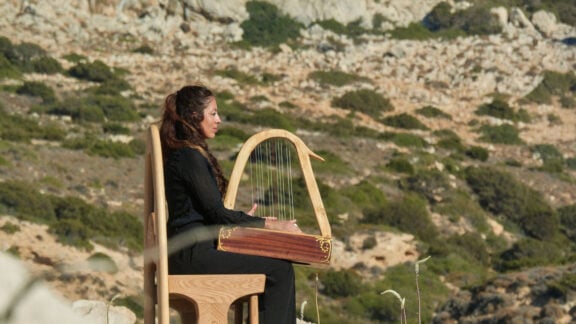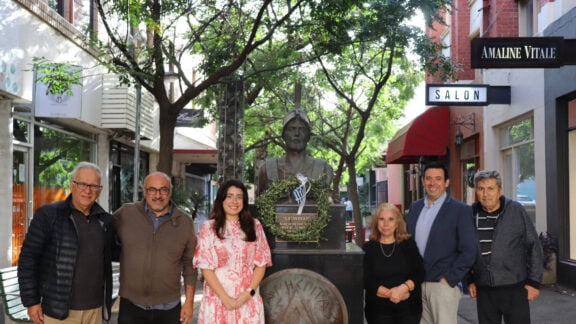Storytelling is precious. It is an is opportunity to pause and critically-reflect. To recognise a more measured sense of our worlds. In Hellenic Dreaming: Greek-Australian Stories an assortment of diasporic chroniclers gives fresh meaning to diasporic storying.
Edited by seasoned journalist and more recently academic Dr Helen Vatsikopoulos, ‘Hellenic Dreaming’ was launched at the Greek Festival of Sydney. The impressive publication is a gift of diverse storytelling genres. Oral interviews, personal essays, short stories, historical prose, photography, poems, and memoir capture a chorus of pasts that matter in the present.
Evolution of Greek-Australian storytelling
Hellenic Dreaming harnesses a collective desire to reflect and share. Moving away from feel-good accounts of Greeks personifying a ‘successful chapter in the overall multicultural story’, we are invited to traverse an arc of diasporic experience and expression. With patience and persistence, Vatsikopoulos, who directs the Greek Writers Festival (a lively feature of the Greek Festival of Sydney), has brought together an assembly of voices.
Voices that call out diverse directions that chart the vicissitudes of Greek-Australian life. Dated traditions and misplaced assumptions, traumatic historical events and returning to past homelands, and friendship and feminism are tapped into.
Then there is that loaded question ‘Are Greeks ‘white’?’ As well as, recording the heritage value of migrant architectural vernaculars – Corinthian columns fused with brick veneer. The themes capture Australia’s many Greek diasporas and micro-cultures, communal and individual histories. One time and place, more than one past and various futures.
The storytellers reveal a diversity of practices and representations that create a unique, even at times fragile architecture, build on seven pillars. A visual, performative, and text-based diasporic drama.
Diverse Voices and perspectives
George Megalogenis presents a curated historical account. He moves from Federation in 1901 to the post-war Greeks who arrived from 1957 to the 1970s. He maps the shift in migrant demographics that make-up our transcultural cities.
Nick Pappas charts the distinctive cultural endurance of Kastellorian associations, many established in the 1920s. He delves into how they are being reimagined. Shifting from community survival and to valuable cultural endeavours. Komninos Zervos’s 1990 poem ‘Nobody Calls Me Wog Anymore’ sits in tandem with Martha Augoustinos’s recalling that she ‘was the wog girl’. Together they reenforce that discrimination stung and was resisted.
Nicolas Doumanis takes us to 1922 and the destruction of Smyrna – the multiethnic ‘Paris of the Levant.’ He gives refreshing meaning to why the city’s ruin by the Young Turks, regulars and irregulars caught the eye of the western imagination.
Photo essays initiate a visual reimagining of our heritage. Emmanuel Angelicas returns to his Marrickville project in Greek Sydney. His capturing of subcultures mediates between public and private spheres. Performative youths and his mother holding a portrait of his late father are given equal attention.
Effy Alexakis’s presents a photographic portfolio of prominent and everyday Hellenic Australians wearing ‘traditional’ attire. Lex Marinos and Costa Georgiades, and less familiar faces– smile back at us. The playful rendering shows how culture can be retained and reworked. Alexakis is known for working in black-and-white, yet these images are full of colour. Their vibrancy proves that binding with the past can be both meaningful and entertaining.

Intergenerational reflections and future narratives
Love and camaraderie also permeate. Olympia Nelson beautifully reflects on her relationship with her mother, Polixeni Papapetrou, a photographic artist who tackled themes of identity, childhood, masking, and performance.
Papapetrou departed this word in 2018. Nelson was 21 when her mother died, she gives voice not only to the voyage of grief but also to the journey shared between ‘mother/daughter, photographer/model, and artist/muse.’
Koraly Dimitriadis’s poem ‘Yia Yia Mou’, speaks across generations with a welcome feminist blaze. Her words counteract misplaced and persistent patriarchal traditions. Andrew Pippos reminds us of the value of companionship. His story of a tree – which has acquired the power of speech – dishing off kindness to a confused man is a gentle reminder of our need for shelter.
Kat Zam focuses on queerness and her story of coming out as a lesbian. How she confronted the ‘good Greek girl’ trope is core to her self-presentation. An oral interview with Peter Polities takes Greek queerness a step further. Weaving class, the politics of writing, dumb masculinities, and searching for an authentic voice, Polites propels us to reconsider what diasporic stories we tell. Drawing on his inspiration for his latest novel, God Forgets About the Poor, he asks us to imagine embodying the experiences of migrant women.
Employing history Alexandra Dellios darts between the past and present. Her prose thrusts forward a need for migrants and their descendants to see history making as a loaded collective practice that is full of responsibility – to individuals, families, and communities. For Dellios – a daughter of migrants with origins in Northern Greece and Asia Minor – regional places of departure, and suburban sites of settlement deserve attention. She pushes us to ‘resist the simplified and white-washed narrative of migrant success.’
Hellenic Dreaming reinforces the Diaspora’s desire to narrate their own stories. Greek-Australian storytelling has evolved. Diasporic storytelling has evolved and is taking on new forms. The storytellers in Hellenic Dreaming weave a connecting theme – the rejection of common popularised narratives of ‘the migrant history’.
Diasporic storytelling is a unique practice. It provides alternative framings of pasts, cultivating new perspectives on our presents and futures. There is also the gratifying reality of younger generations who are now active participants in reflecting on the histories of their forebears. Storytellers are dreaming large.
The event is accessible online until Tuesday 31 December 2024, Select tickets here.
*Dr Andonis Piperoglou, Hellenic Senior Lecturer in Global Diaspora, School of Historical and Philosophical Studies, The University of Melbourne








